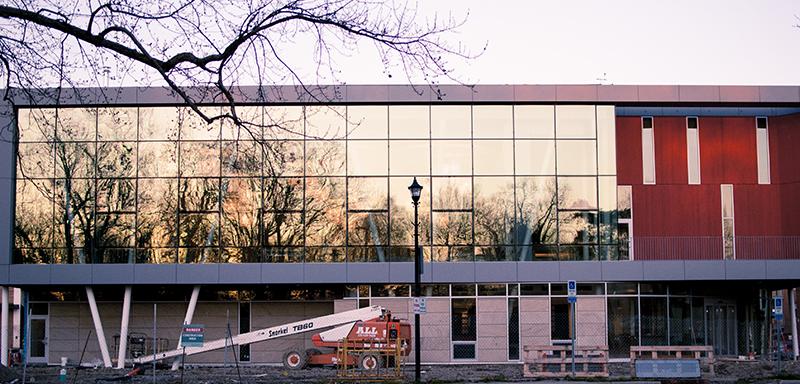College Sues City Over Gateway Center
Benjamin Shepherd,Photo editor
Construction continues on the $38 million Gateway Center as the College and city spar over parking. The College recently filed a lawsuit against the city to get the permits necessary for opening the center.
April 15, 2016
After postponing its opening date for several months, Oberlin College officials filed a lawsuit last week against the city of Oberlin in an attempt to get the $38 million Peter B. Lewis Gateway Center the permits it needs to open. The suit comes after the city repeatedly rejected Oberlin College’s proposed parking plans for the convention center, which has forced the school to postpone the opening twice so far.
The complaint stated that the city was unreasonably withholding the permits and is seeking a court order to force the city to allow for the opening of the Gateway Center.
City officials are withholding an excavation permit, which would allow sidewalk construction outside the hotel, and an occupancy permit, which would allow the hotel to open. The city is refusing to issue the permits until the College changes its current parking plans, which allegedly impede fire trucks’ access to water pump connections and violate fire safety codes.
The proposed plans include creating 19 angled parking spaces along East College Street, something many local business owners strongly favor. According to the suit, this plan was approved by the city in October 2013.
The parking spaces along East College Street were removed when construction began in September 2014. According to Cowhaus co-owner Josef Bomback, OC ’76, the lack of parking on College and Main Streets led to a 30 percent drop in revenue.
The College has been in conflict with the city over the parking spaces since the end of last year.
“Throughout the planning and construction of the new Hotel at Oberlin, the College has sought to maintain the previously existing on-street angled parking along East College Street, which has existed in this location for more than a generation,” Tita Reed, assistant to the president for community and government relations, wrote in an email to the Review. “This parking configuration is in keeping with the traditional fabric throughout downtown Oberlin and is in compliance with the planning and zoning codes.”
Bruce Rinker, the College’s attorney, filed the complaint last Wednesday with the Lorain County Court of Common Pleas. The lawsuit claims that the project is being illegally regulated by the Oberlin Planning Commission.
Scott Wargo, Director of Media Relations at Oberlin College, said that the suit was used as a last resort to try to get the hotel open on time.
“The College exhausted every alternative and sought to find a collaborative resolution, but when those efforts were unavailing, the College was compelled to file suit to avert substantial economic and operational damage — both to the College itself and potentially to city residents and business owners downtown,” Wargo wrote in an email to the Review.
Although the City Planning Commission officially voted to approve the plans in July 2014, additional restrictions and requirements mandated by the city have cost the College more than $200,000 in off-site improvements and nearly $800,000 in other site improvements not required by the city code.
“The issue here isn’t fire safety — it’s the enormous and unnecessary expense that city staff have chosen to impose on the College, against the wishes of the Planning Commission, city residents and downtown business owners,” Wargo said.
In Reed’s statement to the Review, she said that they wouldn’t be the ones benefitting from the spaces. Local merchants, shoppers and guests of the hotel will reap the biggest benefit from the additional parking. She added that, based on the College’s assessment, angled parking isn’t in violation of the city’s fire codes.
“We have been working in partnership with city residents and business owners to cultivate a mechanism for economic development and look forward to the Gateway complex becoming an economic driver in the community,” Wargo said. “We’re looking forward to the Gateway Center opening as soon as possible for all to enjoy.”
Oberlin city officials could not be reached for comment.
“The College has had numerous meetings with city staff in an attempt to resolve the matter,” Reed said in her statement to the Review. “They have rebuffed all suggestions and have refused to grant the final permit that would allow for completion of construction and the opening of the hotel. The College’s only option was to file a court complaint to seek resolution on the matter.”
























